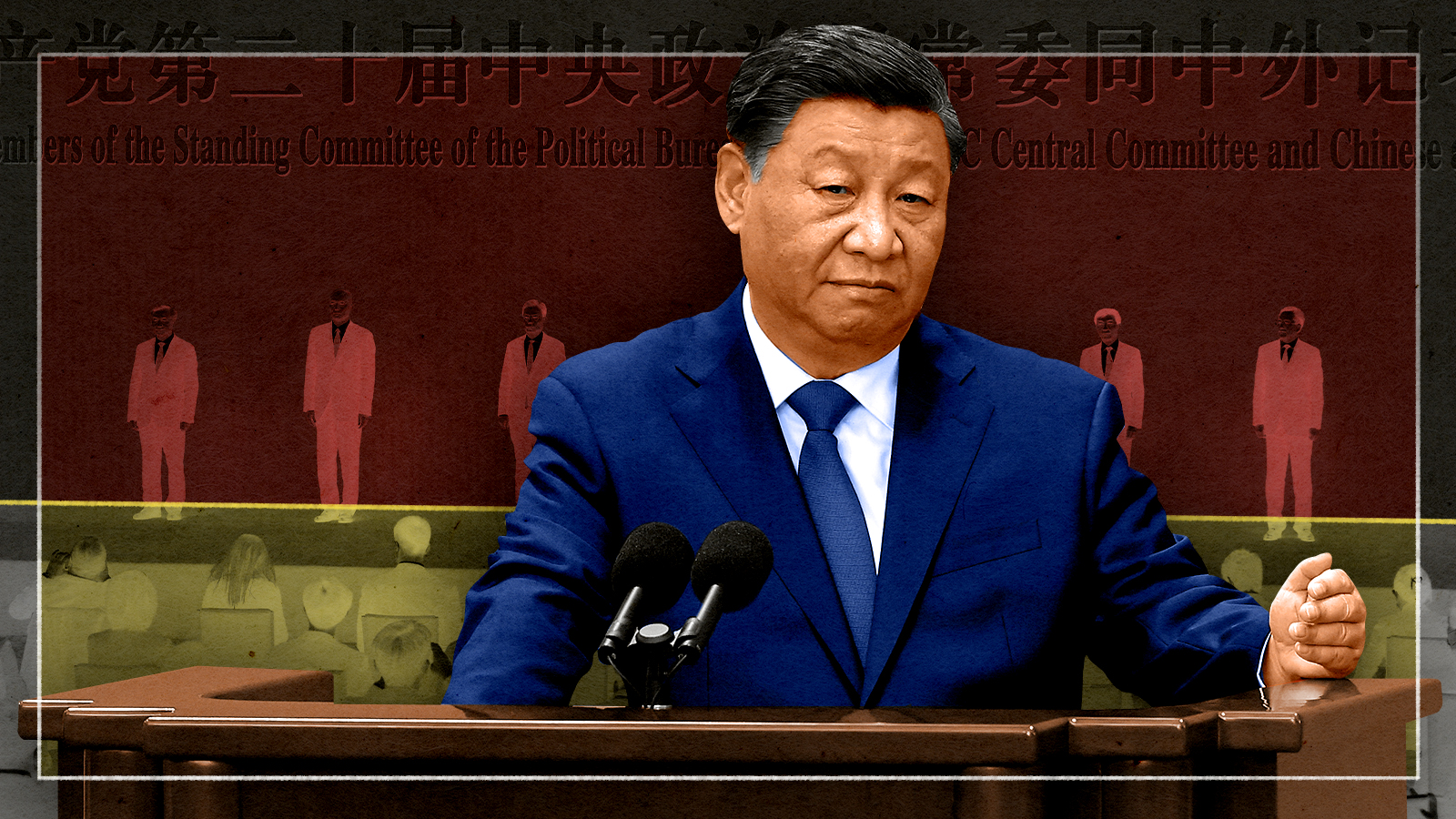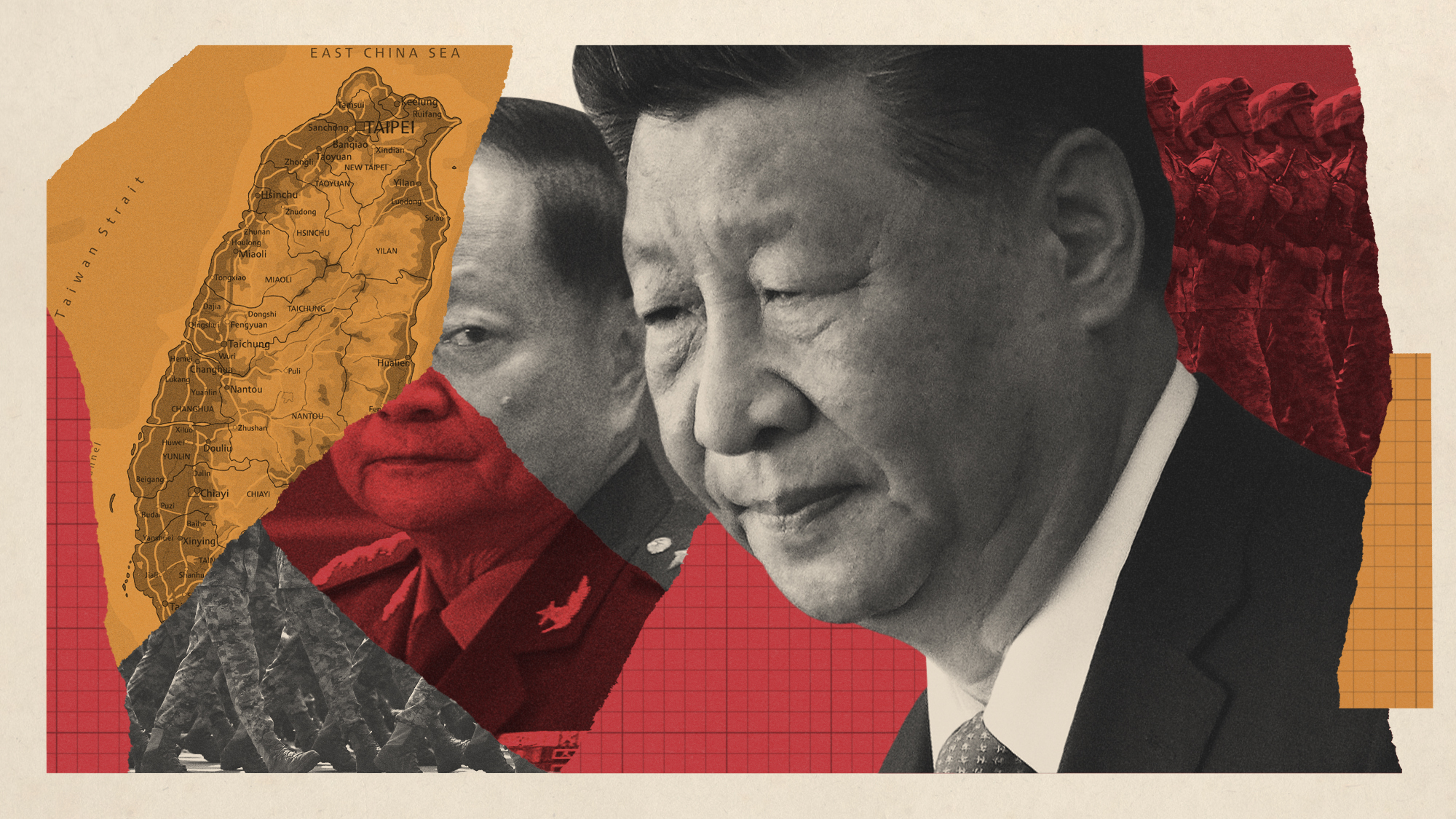What happened at the 20th National Congress of the Chinese Communist Party?
The meeting happens twice a decade, but this one was more eventful than usual


A free daily email with the biggest news stories of the day – and the best features from TheWeek.com
You are now subscribed
Your newsletter sign-up was successful
In October, leaders of China's Communist Party (CCP) gathered for the twice-a-decade National Congress. During the event, China took a number of unprecedented steps culminating with President Xi Jinping being granted a third term, making him the most powerful Chinese ruler since Mao Zedong, founder of the People's Republic of China, reports Reuters. Here's everything you need to know:
What is the National Congress of the CCP?
The National Congress began convening in the 1970s and has met every five years since in order to choose new leadership and make changes to the governing charter if necessary, explains The Wall Street Journal. The most recent meeting is the 20th convening since the Communist Party was founded in 1921.
The CCP Congress began after Mao Zedong's rule in order to ensure timely leadership changes preventing another Mao-style dictatorship in the country. The meeting consolidates close to 2,300 delegates of the Communist Party to elect a new Central Committee, which makes up the top leadership of the party and includes around 200 members as well as alternates. The Committee has the power to elect the General Secretary, members of the Politburo (the highest policy-making body), and its Standing Committee, as well as the Central Military Commission.
The Week
Escape your echo chamber. Get the facts behind the news, plus analysis from multiple perspectives.

Sign up for The Week's Free Newsletters
From our morning news briefing to a weekly Good News Newsletter, get the best of The Week delivered directly to your inbox.
From our morning news briefing to a weekly Good News Newsletter, get the best of The Week delivered directly to your inbox.
This year, the National Congress was more eventful than those in the past because it broke a number of precedents.
What are the highlights of this year's Congress?
Here are some of the major takeaways from this year's meeting:
Hidden figures
Early in the Congress, China announced that it would be delaying the release of its third-quarter economic statistics, including GDP. The announcement led many to believe that the data would show worse results than expected given the country's economic struggles over the last couple of years. Historically, countries have rarely delayed releasing statistics because it tends to indicate a weak economy and cause distrust amongst investors.
Despite saying the delay was indefinite, China unexpectedly released the data the Monday after the end of the CCP Congress, The Washington Post reports. The National Bureau of Statistics reported that the GDP grew 3.9 percent between July and September of this year, which, while higher than expected, is still below the government's annual target of 5.5 percent.
A free daily email with the biggest news stories of the day – and the best features from TheWeek.com
Leadership let-downs
During the session, the CCP approved its new Central Committee, which excluded two big names: Premier Li Keqiang and Vice Premier Wang Yang, reports NPR. Li was famously the country's number two official and Wang was rumored to be Li's successor. Analysts say that neither person was particularly close to President Xi Jinping, and their removal allows for the upper echelon of leadership to be made up only of allies. Li in particular was in favor of market-based economic reforms, which go against Xi's goal of expanding state control over the economy, The Associated Press explains.
Li and Wang are among four of the seven members of the Politburo Standing Committee, the highest level of the CCP, who were excluded from the new Central Committee. Only members of the Central Committee can be on the Standing Committee, putting an end to either person holding leadership within the CCP.
Round three
Perhaps the biggest outcome of this year's convening was Xi Jinping awarding himself a third term as leader of the Communist Party. He was unanimously voted in, which was an expected result given that term limits were removed from the Chinese constitution in 2018. With the unprecedented third term, there is speculation that Xi will attempt to remain in his position for life, BBC notes.
This has caused some protests within China, starting with the former general secretary of the CCP, Hu Jintao, who needed to be escorted out of the meeting hall after he cast his vote for the Central Committee. An anti-Xi banner was also briefly seen in Beijing before promptly being taken down, reports CNN. The occurrence caused a censorship ramp-up in the country.
Tying down Taiwan
The Congress formally approved an amendment to the governing charter to "resolutely oppose and suppress Taiwan independence," Taiwan News reports. In a speech Xi made at the start of the conference, he remarked that he "will never promise to renounce the use of force and [will] reserve the option of taking all measures necessary" to take control of the island.
As a result, U.S. Secretary of State Anthony Blinken warned that Beijing is "on a much faster timeline" for pursuing reunification with Taiwan, which was previously not expected to happen until 2027 according to experts.
Politburo prejudice
On Sunday, China announced its new Politburo, made up of 25 members of the CCP who oversee the rest of the party, and for the first time in 25 years, it does not include a single woman. For the next five years, the country will be ruled by a group made up entirely of men, marking a major setback in gender representation, Bloomberg reports. Xi himself has said in the past that women should "shoulder the responsibilities of taking care of the old and young, as well as educating children," despite pledging to stay committed to gender equality.
The seven-member Standing Committee was also announced and includes four newcomers. All of those appointed have close ties and affiliations to Xi, Reuters reports.
What's next for China?
With Xi claiming a third term, there is likely to be more global tension between China and the west. Xi has shown no signs of removing the zero-COVID policy, which has caused economic problems for China. He also continues to create tension by laying claim to the entire South China Sea as well as refusing to condemn Russian President Vladimir Putin's actions in Ukraine, AP explains. Taiwan also faces a great threat as Xi has made clear that he will never recognize its independence.
Also, since the country no longer has term limits, Xi may attempt to extend his term for as long as possible, leading to a dictatorial regime like Mao Zedong's. This also counteracts the purpose of the CCP Congress to begin with.
"Our country has entered a period when strategic opportunity coexists with risks and challenges," Xi said in a speech to the Congress. "[T]he world has entered a period of turbulence and transformation."
Devika Rao has worked as a staff writer at The Week since 2022, covering science, the environment, climate and business. She previously worked as a policy associate for a nonprofit organization advocating for environmental action from a business perspective.
-
 The UK expands its Hong Kong visa scheme
The UK expands its Hong Kong visa schemeThe Explainer Around 26,000 additional arrivals expected in the UK as government widens eligibility in response to crackdown on rights in former colony
-
 ‘Hong Kong is stable because it has been muzzled’
‘Hong Kong is stable because it has been muzzled’Instant Opinion Opinion, comment and editorials of the day
-
 What do Xi’s military purges mean for Taiwan?
What do Xi’s military purges mean for Taiwan?Today’s Big Question Analysts say China’s leader is still focused on reunification
-
 What is at stake for Starmer in China?
What is at stake for Starmer in China?Today’s Big Question The British PM will have to ‘play it tough’ to achieve ‘substantive’ outcomes, while China looks to draw Britain away from US influence
-
 ‘It’s good for the animals, their humans — and the veterinarians themselves’
‘It’s good for the animals, their humans — and the veterinarians themselves’Instant Opinion Opinion, comment and editorials of the day
-
 The billionaires’ wealth tax: a catastrophe for California?
The billionaires’ wealth tax: a catastrophe for California?Talking Point Peter Thiel and Larry Page preparing to change state residency
-
 What is China doing in Latin America?
What is China doing in Latin America?Today’s Big Question Beijing offers itself as an alternative to US dominance
-
 Bari Weiss’ ‘60 Minutes’ scandal is about more than one report
Bari Weiss’ ‘60 Minutes’ scandal is about more than one reportIN THE SPOTLIGHT By blocking an approved segment on a controversial prison holding US deportees in El Salvador, the editor-in-chief of CBS News has become the main story



